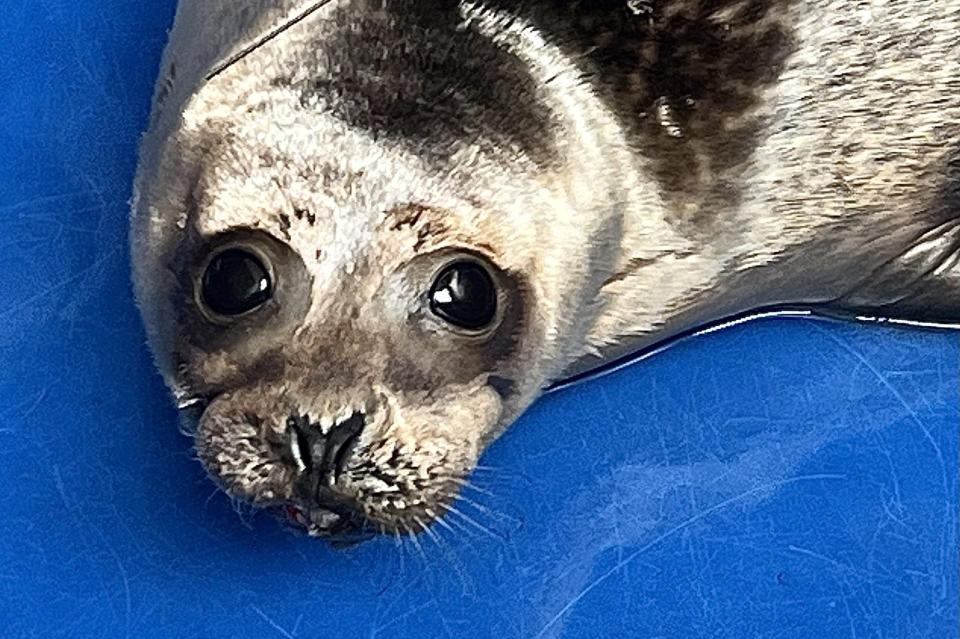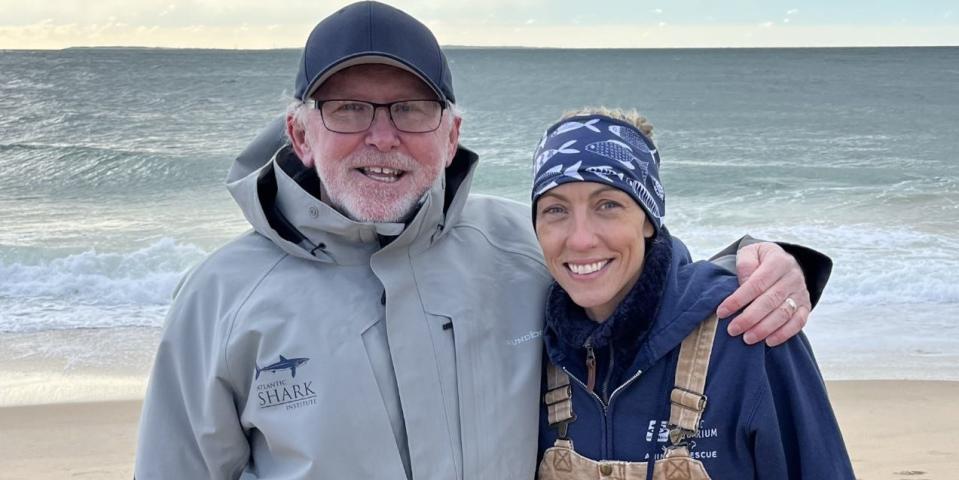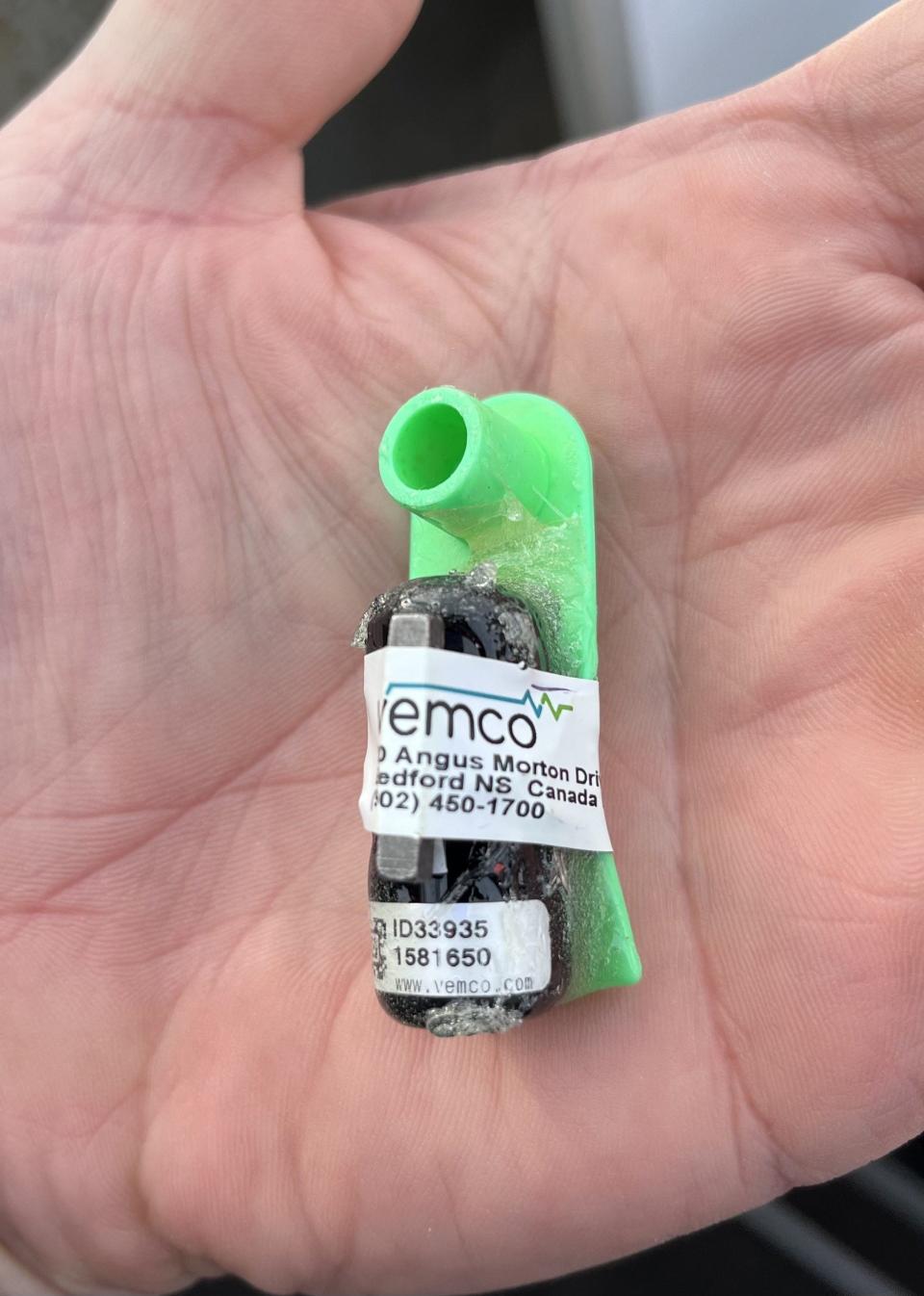Will great white sharks take up residence off RI? Rehabbed seal 'Scarlet' will help find out
CHARLESTOWN – A young harbor seal released into the cold, crashing waves off Blue Shutters Beach on Friday may help researchers understand whether great white sharks will hang around Rhode Island waters.
"Meet Scarlet, the newest and perhaps most valuable member of our research team," the Atlantic Shark Institute in Wakefield said in a Facebook post with video showing Scarlet wriggling herself toward the ocean as people cheered.
Rehabilitated at Mystic Aquarium in Connecticut, Scarlet is the first seal released in Rhode Island waters wearing both a satellite tag and an acoustic tag, according to researchers.

The satellite tag will enable researchers to track her movements when she is swimming at the surface or has pulled herself onto a beach, and the acoustic tag will let them track her underwater, according to the institute.
Scarlet is part of a cooperative research effort by the institute, Mystic Aquarium, the Rhode Island Department of Environmental Management and the Atlantic Marine Conservation Society.
More: They built a shark barrier off Cape Cod. Does Rhode Island need one?
"This long-term collaboration is designed to answer questions about seal movement in New England and surrounding waters (particularly Block Island, RI) how and when they might interact with great white sharks and much more," the Atlantic Shark Institute said in the Facebook post.
Jon Dodd, executive director of the Shark Institute, expects Scarlet to help researchers better understand the relationship between seal populations and great white sharks. Seals are a popular meal for great white sharks, and Dodd wants to know how a growing seal population on Block Island might affect the travel and feeding patterns of the top predators.

Will Block Island attract white sharks the way Cape Cod does?
The waters off outer Cape Cod have attracted tens of thousands of seals and, as a result, hundreds of adult great white sharks spend their summers off Cape Cod, feasting on the fatty seals, Dodd said. Rhode Island doesn't attract nearly as many seals, and the only adult white sharks found in these waters are passing through on their way to the banquet off Cape Cod, Dodd said.
But the seal population off Block Island has increased dramatically over the last several years, numbering 200 to 300, and Dodd wants to know whether that population could grow large enough to attract adult white sharks that would spend the entire season in Rhode Island waters.
"What size does it have to be for a white shark to say, 'I'm not going to Cape Cod?" Dodd said in an interview. "Will there someday be a white shark population that calls Block Island home over the summer months?"
Scarlet healed at Mystic Aquarium
Scarlet was rescued in Essex, Massachusetts, and brought to Mystic for rehabilitation in November, according to Sarah Callan, manager of animal rescue at Mystic Aquarium. She was given the name Scarlet because of a severe wound to her face. Callan doesn't know how she might have gotten it.
At Mystic, Scarlet's wound was treated. She was given medicine and fed.
"She ate like a champ right away," Callan said. "She was definitely very hungry."
More: Rare opportunity: 9-foot porbeagle shark found on East Beach; researchers plan necropsy
When she was released, Scarlet was 70 pounds, "a nice healthy weight, for sure," Callan said. She's believed to be just 8 or 9 months old.
Over the last two to three years, Mystic has released about 20 rescued seals with satellite tags only, according to Callan. Having put both satellite and acoustic tags on Scarlet, researchers will see a more complete picture of her travels.
They will also be able to monitor her longer, since the satellite tags typically fall off within about six months, while the acoustic tags last for about two years, Dodd said.
Scarlet will have help
It won't be up to Scarlet to provide all of the answers. Conor McManus, the DEM's Marine Fisheries chief, says the agency wants to work with its partners in tagging as many as 25 more rescued seals.
"Do these seals hang out here? What does that mean?" McManus asked.

He wonders: will Block Island attract seals the way the outer Cape does? The Block Island Maritime Institute is also helping with the project by counting seals, according to Dodd.
Where Scarlet will go is difficult to predict, Callan said. Seals can cover a lot of water, and quickly. Mystic seals have gotten to Maine within two or three days of release; one ended up in Greenland in about 10 days, Callan said.
Forty-five acoustic receivers set in Rhode Island waters by the Atlantic Shark Institute and the DEM will pick up Scarlet's signal if she passes by them, according to Dodd. If she heads for New York, Massachusetts or Maine, receivers set by other researchers will also pick up her signal, Dodd said.
"We want to see where these animals are going," Callan said. "It's going to be real interesting."
This article originally appeared on The Providence Journal: Travels of seal released off RI may explain habits of white sharks

